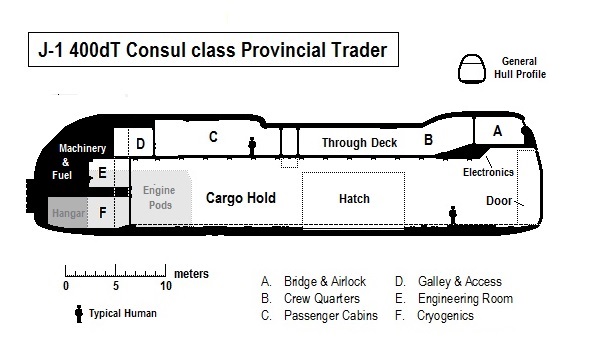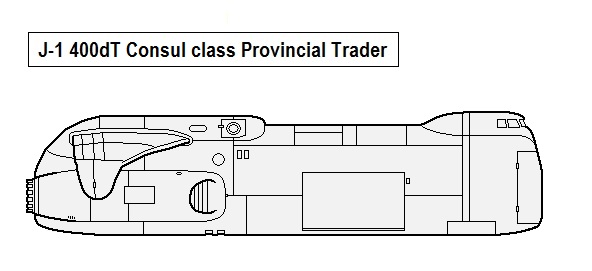Consul class Provincial Trader
| Consul class Provincial Trader | |
|---|---|
 | |
| Type: AF Free Trader | |
| Category | ACS |
| Size | 400 Tons |
| Hull Configuration | Cone Hull |
| Streamlining | Streamlined Hull |
| Tech Level | TL–9 |
| Engineering | |
| Computer | Model/1 |
| Jump | J-1 |
| Maneuver | 1 G |
| Fuel Treatment | Scoops |
| Armaments | |
| Hardpoints | 4 |
| Offensive | 1 3x Beam Laser, 1 3x Missile Launcher, 2 3x Sandcasters |
| Accommodations | |
| Staterooms | 20 |
| Low Berths | 11 |
| Personnel | |
| Crew | 11 |
| Officers | 3 |
| Enlisted | 8 |
| High/Mid Passengers | 14 |
| Low Passengers | 11 |
| Payload | |
| Cargo | 210 Tons |
| Fuel tank | 44 Tons |
| Carried craft | 1 4t bay |
| Construction | |
| Origin | Distant Fringe |
| Price | |
| Cost | MCr143.658 |
| Statistics | |
| Quick Ship Profile | AF-DS11 |
| Universal Ship Profile | AF-4211111–030000–20003-0 |
| Images | |
| Blueprint | Yes |
| Illustration | Yes |
| Source | |
| Canon | Unpublished, fan design |
| Designer | Adie Alegoric Stewart |
| Design System | High Guard |
| Era | 1105 |
| Reference | Fan: Adie Alegoric Stewart |
| Starships are designed with the Classic Traveller format, using High Guard Shipyard v1.13 written by Andrea Vallance. | |
The Consul class Provincial Trader is a TL–9 mercantile starship.
- Please also see: Ships of the Distant Fringe
Description[edit]
It is a vessel with 1-G and J-1 performance with a streamlined Cone Hull.
- It carries light armament and a defensive suite.
- It ordinarily carries no subcraft, no ship's vehicles, and drones when needed.
The Consul class Provincial Trader is a civilian vessel. It is a commercial transport typically encountered operating within clusters of stars within the Distant Fringe region. It is classified as a merchant vessel and is constructed as a conventional design. Similar designs have been in use from the time the Distant Fringe was first settled.
Image Repository[edit]
General Description & Deck Plans[edit]
The Consul class is a streamlined cone with a mean width of 11 meters, a mean height of 12 meters, and a length of around 50 meters, tapering towards the aft of the vessel. There are two lateral engine pods and a raised dorsal section, referred to as the saddle, at the rear of the vessel. Downward-swept airfoil surfaces and tailplanes that give improved atmospheric maneuvering capability are mounted on the sides of the saddle. The bridge and main airlock are forward, the passenger and crew cabins are located centrally, the engineering control room lies aft, and below that are the cryogenic facilities and the ventral airlock. A narrow vehicle hangar, lying between heavy drive machinery, is situated directly aft of the cryo section. The ship has a total enclosed volume of approximately 5,400 cubic meters.
- The design is a variant of the Joshim P. Stone class Provincial Trader.
- The design is related to the Colossus class Heavy Lander.

A basic deck plan of the vessel indicating the general layout and positioning of major elements.
Basic Ship Characteristics[edit]
Following the Imperial Navy and IISS Universal Ship Profile and data, additional information is presented in the format shown here. The small craft factor indicates the number of squadrons (...of ten subcraft) carried on the ship. Tonnage on the universal ship profile is shown in kilotons (...thousands of tons) where necessary. [1]
| Basic Ship Characteristics [2] | ||
|---|---|---|
| No. | Category | Remarks |
| 1. | Tonnage / Hull | The Provincial Trader is constructed using a 400-dTon hull built in a generally cone-shaped configuration. The hull is fully streamlined and has airfoil surfaces, giving good atmospheric performance that is reliant on its onboard gravitic systems.
|
| 2. | Crew | Total Crew Complement: x11.
Accommodations
Accessible areas of the hull are fitted with grav plates and inertial compensators and have full life support and environmental systems.
|
| 3. | Performance | The vessel mounts a DeVoss-type Jump-1 drive, a Maneuver-1 drive and a Power Plant-1, giving performance of jump-1, 1-G acceleration and producing 4 Energy Points. The ship has an agility rating of 0 and an emergency agility of 1. The internal fuel tankage is sufficient for one Jump-1 and gives the power plant 4 weeks duration.
|
| 4. | Electronics | Adjacent to the bridge is a Model/1 Computer: there is no backup computer.
|
| 5. | Hardpoints | x4 hardpoints.
|
| 6. | Armament / Weaponry | The normal weapons fit-out for a Consul class is:
x1 triple Beam Laser turret, firing as an independent battery. x1 triple Missile turret, firing as an independent battery.
|
| 7. | Defenses | The hull is unarmored.
x2 triple Sandcaster turrets, grouped into one battery of 2 linked turrets. The vessel is not fitted with screens or other passive defensive systems. |
| 8. | Craft / Drones | The ship has a dedicated hangar able to house a vehicle of up to 4-dTons, though no vehicles are ordinarily provided. The hangar may be used as an auxiliary airlock. |
| 9. | Fuel Treatment | The vessel has internal fuel tankage of 44.0 dTons.
|
| 10. | Cost | The basic cost of the vessel is MCr143.658.
|
| 11. | Construction Time | 64 weeks (16 months) as standard.
|
| 12. | Remarks | Standard cargo capacity amounts to 210 dTons.
|
History & Background[edit]
The Provincial Trader is considered underpowered and suffers performance issues in high gravity environments. It is a design that dates to the time of the Terran Confederation: elements of the design and construction indicate that the vessel has Vilani origins. The design is representative and a large number of variants exist, particularly with regard to the allotted weapons systems, onboard electronics, and the fit out of internal spaces.
Distant Fringe Vessels[edit]
The Distant Fringe is said to be a far spinward-rimward area inhabited by colonists and refugees originating on Terra. The region is extremely isolated, separated from the rest of Charted Space by vast, almost uncrossable rifts that were once broached by a system of calibration Points and the use of tankers. Those few academics within Charted Space who have found references to the Distant Fringe regard it as little more than a tall tale. Likewise, many of the inhabitants of the Distant Fringe believe the existence of Charted Space to be mythical.[3]
Vessels originating within the Distant Fringe are very rarely encountered outside of the region. However, misjumps do occur and anomalies with bizarre spacetime and Jumpspace effects exist: as such, craft of this type are not entirely unknown within Charted Space.[4]
Class Naming Practice/s & Peculiarities[edit]
A number of companies manufacture ships equivalent to the Consul class. They vary in hull shape and internal layout but all share the same basic design and all have very similar capabilities and performance characteristics.
- Each variant class is named by the company that produces it: these organizations generally draw on traditional naming protocols. It is not uncommon for a historical class name to be reused.
- Individual vessels within a class are issued specific serial numbers and transponder codes but traditionally are named by their owners. This is considered a serious affair and a ship with a frivolous name is considered "unlucky".
Selected Variant Types & Classes[edit]
56 Representative Free Trader (AF) Classes[edit]
A
- Akkigish class Far Trader
- Alexandria class Free Trader
- Anjou class Freighter
- Aoa'iw class Light Trader
- April Hare class Far Trader
- Athelstan class Merchant
- Avian class Far Trader
B
- Basil class Merchant
- Beowulf class Free Trader
- Bremen class Caravel
- Burning Sky class Merchant Schooner
C
- Caroline class Heavy Pinnace
- Ciigusna class Pinnace
- ColonyCord class Fast Trader
- Consul class Provincial Trader
- Coriander class Free Trader
E
F
G
H
I
J
K
L
M
N
P
R
S
- Salamander class Far Trader
- Sleeper class Fast Trader
- Soho class Light Freighter
- Stage class Far Trader
- Star class Armored Merchant
- Sundowner class Free Trader
T
- Tachyon class Light Trader
- Tequila class Free Trader
- Treader class Free Trader
- Trojan Reaches Type A3 class Trader
- Type Aj class Free Trader
- Type HR class Trader
U
V
W
References[edit]
| This article has metadata. |

|
This ship was originally designed using one of the Classic Traveller ship design rules:
|
- Author: Lord (Marquis) and Master Scout Emeritus Adie Alegoric Stewart of the IISS
- Contributors: Tony Stroppa, Steve Carr (design concepts and development)
- ↑ Timothy B. Brown. Fighting Ships (Game Designers Workshop, 1981), 10.
- ↑ Timothy B. Brown. Fighting Ships (Game Designers Workshop, 1981), 10.
- ↑ Information provided to the library by Maksim-Smelchak
- ↑ Information provided to the library by Maksim-Smelchak
